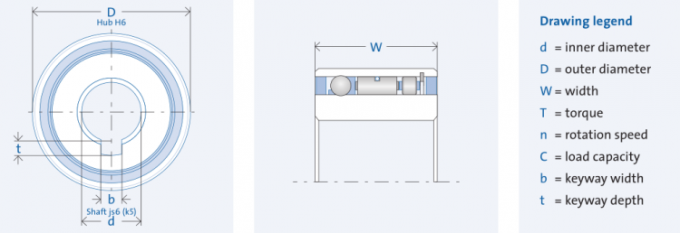Ago . 13, 2024 21:01 Back to list
Exploring Specialized Bearing Varieties Utilized in Induction Motor Applications and Their Benefits
Custom Types of Bearings Used in Induction Motors
Induction motors are integral to countless industrial and commercial applications due to their robustness, efficiency, and reliability. One of the critical components that contribute to the performance and longevity of these motors is the bearing system. The choice of bearing can significantly influence the operational efficiency, maintenance intervals, and overall lifecycle of induction motors. This article explores various custom types of bearings used in induction motors, focusing on their specific applications and benefits.
1. Deep Groove Ball Bearings
Deep groove ball bearings are a popular choice for induction motors due to their simple design and versatility. They can accommodate both radial and axial loads, making them suitable for high-speed applications. These bearings often feature seals or shields to protect against contaminants, thereby enhancing reliability. In many induction motor applications, these bearings are customized by adjusting the dimensions or using specialized materials to improve performance under specific load conditions.
2. Self-Aligning Ball Bearings
Self-aligning ball bearings are designed to accommodate misalignment, which is particularly useful in applications where installation conditions may lead to shaft deflection. These bearings consist of two rows of balls and a common spherical outer race, allowing for self-adjustment. Custom designs may feature enhanced clearance or specific cage designs to optimize performance in induction motors subjected to variable load conditions.
Spherical roller bearings are another custom option commonly used in heavy-duty induction motors. Known for their ability to handle high radial loads and some axial loads in both directions, these bearings are ideal for applications where alignment issues may arise. Custom spherical roller bearings may be designed with a larger bore or optimized raceway curvature to improve load capacity and reduce frictional losses.
custom types of bearing used in induction motor

4. Tapered Roller Bearings
In induction motors that require higher axial load capacity, tapered roller bearings are often employed. These bearings can handle both radial and axial loads due to their unique design. Custom variants may be engineered with specific roller and raceway profiles to enhance load distribution and minimize wear, which can significantly improve motor efficiency and lifespan.
5. Magnetic Bearings
As technology advances, magnetic bearings have emerged as a novel solution for high-performance induction motors. These non-contact bearings eliminate friction by using magnetic fields to levitate the rotor, resulting in virtually no wear. Custom magnetic bearings can be tailored to specific motor designs, allowing for improved efficiency and reduced energy consumption. Although more expensive, these bearings offer significant advantages in applications requiring high speeds and precision.
6. Ceramic Bearings
Ceramic bearings are increasingly popular in induction motors, particularly in high-speed or high-temperature applications. They are known for their superior wear resistance, lower friction, and ability to operate at higher temperatures compared to traditional steel bearings. Custom ceramic bearings may incorporate different ceramic materials or hybrid designs that combine ceramics with steel for enhanced performance and durability.
Conclusion
The choice of bearing in an induction motor plays a pivotal role in defining the motor's overall performance, efficiency, and reliability. Custom bearings, such as deep groove ball bearings, self-aligning ball bearings, spherical roller bearings, tapered roller bearings, magnetic bearings, and ceramic bearings, can be tailored to meet the specific needs of diverse applications. By selecting the appropriate custom bearing type, manufacturers can enhance the performance and longevity of induction motors, ultimately leading to greater operational efficiency and reduced maintenance costs. As industries continue to evolve and demand more from their motors, the importance of custom bearing solutions will undoubtedly grow.
Latest news
-
25MM 2 BOLT UCFLX05-14 Flange bearing unit( oval)
NewsMar.07,2025
-
4 bolt UCF 200 series Pillow block bearings
NewsMar.07,2025
-
25MM 2 BOLT UCFLX05-14 Flange bearing unit( oval)
NewsMar.07,2025
-
UCF216-50 4-Bolt Flange Housing Square Bearing
NewsMar.07,2025
-
25MM 2 BOLT UCFLX05-14 Flange bearing unit( oval)
NewsMar.07,2025
-
spherical roller bearing material exporter
NewsMar.07,2025





